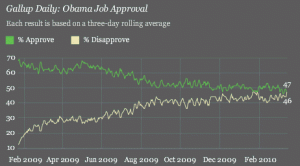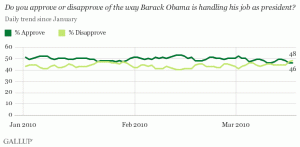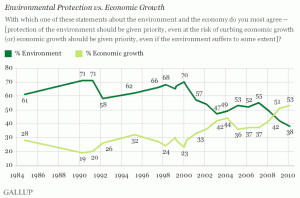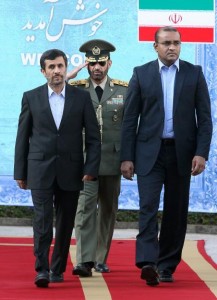 President Barack Obama continues to endure a steady slide in his approval rating amongst all American adults as Gallup revealed yesterday that, for the first time in his young Presidency, more Americans disapprove of Obama’s job performance (47%) than approve (46%). Gallup, of course, has been a left-leaning pollster for many years now and, despite President Obama reaching this historical milestone of more disapproval than approval amongst all Americans, Gallup has not issued any form of article or press release regarding their own data. The chart from Gallup to the left shows the slow but steady deterioration of Obama’s approval and building disapproval since Inauguration Day.
President Barack Obama continues to endure a steady slide in his approval rating amongst all American adults as Gallup revealed yesterday that, for the first time in his young Presidency, more Americans disapprove of Obama’s job performance (47%) than approve (46%). Gallup, of course, has been a left-leaning pollster for many years now and, despite President Obama reaching this historical milestone of more disapproval than approval amongst all Americans, Gallup has not issued any form of article or press release regarding their own data. The chart from Gallup to the left shows the slow but steady deterioration of Obama’s approval and building disapproval since Inauguration Day.
Further, well-respected Democratic pollster Public Policy Polling (“PPP”) also now shows Obama underwater with the American people for the first time, at 47% approval and 48% disapproval amongst American registered voters. PPP’s director Tom Jensen, who it should be noted was one of the few pollsters to accurately predict Republican Scott Brown’s victory in January 2010, discussed his polling and the first net negative showing for Obama in the Gallup measure, pointing out that Obama is now losing core supporters who delivered him the Presidency:
Barack Obama dropped into negative territory in Gallup for the first time today, and I can tell you one big reason why from our polling.
Since the calendar turned to 2010 there has been a noticeable drop in Obama’s approval among people who say they voted for him in 2008. Our monthly surveys from August to December found him at anywhere from 89 to 93% approval with his original voters. Our January to March polls have shown that number down in the 83 to 85% range.
Most of Obama’s approval drop over the course of 2009 was the result of people who voted for John McCain but initially wanted to give Obama a chance shifting from approval to disapproval of him over the course of his first year. That was really no big deal for Obama and a perfectly normal thing to happen to any President once the honeymoon is over. But this drop in support he’s seeing now from his core supporters is a more troubling sign and something he’s going to need to overcome.
A final troubling trend for President Obama, who has prioritized the environment during his Administration so far with his push for “climate change” legislation, is the historical decline in Americans who prioritize environmental protection over economic growth as “for only the second time in more than two decades and the second straight year, Americans are more likely to say economic growth should take precedence over environmental protection when the two objectives conflict (53%) than to say the reverse (38%).”
Taken together, the Obama Administration’s focus on the unpopular comprehensive health care bill and the environmental measures such as cap and trade appear to be causing Obama to now lose core supporters who put him the White House in 2008. Indeed, it appears to us that the President’s overall job approval is moving down, while the support for Obamacare is moving up slightly, and the two numbers may be destined to meet somewhere in the low 40% range. As the tension builds over the Obama plan to use procedural trickery in the House (“Slaughter Solution”) and the Senate (reconciliation) to pass Obamacare, the continued move of former core Obama supporters away from the President may have an impact on the all-important vote just days from now.

President Barack Obama's Approval (all-time low) and Disapproval ratings (all-time high) with the American People
UPDATE: Gallup decided, finally, to actually issue a report on Obama’s sliding approval ratings, noting that Obama is at an all-time low in approval and an all-time high in disapproval and even points to the obvious cause – Obamacare:
PRINCETON, NJ — President Barack Obama’s job approval is the worst of his presidency to date, with 46% of Americans approving and 48% disapproving of the job he is doing as president in the latest Gallup Daily three-day average.
Obama’s approval rating has hovered around 50% since November, but in the last two days has declined to the point that slightly more Americans now disapprove than approve of his performance in office.
The new low ratings come during a week in which the White House and Democratic congressional leaders are working to convince wavering House Democrats to support healthcare reform, which they hope to pass using a series of parliamentary maneuvers in the House of Representatives and Senate.

